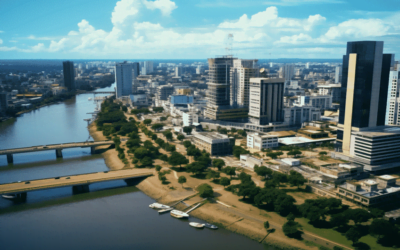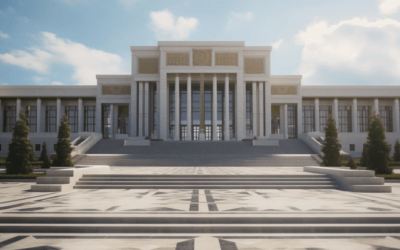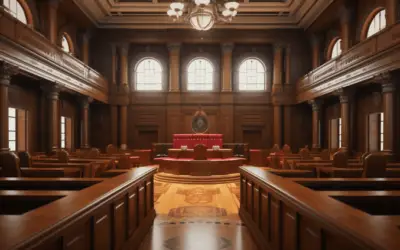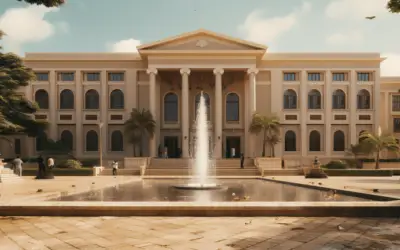Hey there, fellow drone enthusiasts and curious minds! If you’ve ever found yourself curious about the ins and outs of Madagascar’s drone regulations, you’re in good company.
The world of drone laws can be quite puzzling, and the search for clear information can often leave you feeling like you’re navigating uncharted skies.
I get it. I do. So, let me assure you that I’ve got your back. I’ve delved deep into the realm of Madagascar’s drone laws, and I’ve done the legwork to bring you the most up-to-date, reliable, and relevant information.
You see, I wanted to provide you with an all-inclusive guide, a one-stop destination where you can find the answers to all your questions about drone regulations in Madagascar.
Now, if you’re ready to uncover the secrets of Madagascar’s drone laws, you’re in the right place.
I’ve done the research, sifted through the complexities, and made sure that the information I’m about to share is not only accurate but also easy to understand.
So read on, my friend, and let’s navigate the fascinating world of Madagascar’s drone laws together. Your search for answers is about to take flight.
- Regulatory Framework in Madagascar
- Categories of Drone Operators in Madagascar
- Hobbyist Drone Laws
- Commercial Drone Laws
- Drone Laws for Visitors to Madagascar
- Government Drone Laws
- General Drone Laws in Madagascar
- Traveling with Drones
- Impact on Madagascar’s Economy
- Benefits of Drone Laws for Conservation Efforts
- Final Thoughts on Madagascar Drone Laws Review
- Frequently Asked Questions About Madagascar Drone Laws
Regulatory Framework in Madagascar

Picture this: Madagascar, an enchanting island nation where the skies hold both natural beauty and the buzz of drones. In this section, we’ll delve into the intriguing world of Madagascar’s drone regulations.
Regulatory body for drone operations in Madagascar
Now, to get started, let’s meet the guardian of the Malagasy skies—the Civil Aviation Authority of Madagascar (CAAM).
They’re the ones keeping an eye on all things drone-related in this breathtaking land. Think of them as the referees of the drone game, ensuring everything takes place within the rules and regulations.
Key regulations launched in December 2019
It was back in December 2019 when Madagascar decided to step up its game when it came to drone laws. The government saw the potential drones held and the risks they posed.
So, they introduced a set of fresh regulations tailored to ensure safety, privacy, and compliance. These new rules were the turning point in the island nation’s approach to drone operations.
Requirement for drone users to register their devices with CAAM
If you’re thinking about flying your drone in Madagascar, here’s the scoop: you need to register your device with CAAM. It’s like giving your drone an official identity card.
This step not only helps the authorities keep track but also ensures accountability in case anything goes awry. Safety is paramount, after all.
Necessity of obtaining special permits from CAAM for drone operation
But wait, there’s more. Flying your drone in Madagascar isn’t just about registration. You also need a special permit from CAAM.
It’s like acquiring a golden ticket to the drone world in this incredible nation. These permits are designed to make sure that drone operations are done with care, responsibility, and awareness.
Adhering to strict safety rules to ensure compliance
Now, let’s talk about safety rules. Madagascar takes safety seriously, and you should too. Adhering to strict safety rules is not just a matter of following the law; it’s about respecting the skies you share with other aircraft and people on the ground.
These rules are in place to ensure everyone’s well-being and to keep the skies safe and harmonious. So, remember, following the rules is not just a formality; it’s a responsibility that comes with the privilege of drone flight in this unique and picturesque land.
Also Read: Drone Laws in Luxembourg 2024
Categories of Drone Operators in Madagascar

Now, let’s dive into the diverse world of drone operators in Madagascar. Just like the island’s varied landscapes, the drone enthusiasts here come in different shades and types.
Segmentation of drone operators into different categories
Madagascar’s drone ecosystem is as diverse as its unique wildlife. Here, we categorize drone operators into four distinct groups: hobbyists, commercial operators, visitors, and government operators.
Each category comes with its own set of rules and requirements, reflecting the specific purposes and responsibilities that these operators have.
Specific regulations and requirements for each category
It’s fascinating how Madagascar tailors its drone regulations to suit the intentions behind the flight. For hobbyists, there’s a set of regulations to ensure safe recreational flying.
Commercial operators have their own rules to follow to ensure professional and responsible drone use. Visitors and tourists are also considered, with specific guidelines to respect their interests.
Finally, government operators, who are entrusted with unique responsibilities, have their own regulations that ensure the safe operation of drones in the public’s interest.
So, whether you’re flying drones for fun, for business, as a visitor, or as a government representative, Madagascar has regulations in place that cater to specific needs and ensure a harmonious drone environment in this beautiful island nation.
Also Read: Drone Laws in Lithuania 2024
Hobbyist Drone Laws

Now, let’s take a closer look at the rules that govern hobbyist drone operators in Madagascar. Whether you’re an experienced drone pilot or just getting started, it’s essential to know what you can and can’t do in this vibrant island nation.
Prohibition of hobbyist drone flights in Madagascar
Unfortunately, if you’re dreaming of taking your drone for a spin in Madagascar purely for recreational purposes, I have to be the bearer of bad news—it’s a no-go. The skies here are off-limits for hobbyist drone flights.
The Madagascan authorities have decided that drones buzzing around purely for fun just don’t fit the bill. While it might be a bit of a downer for hobbyist pilots, it’s all in the name of safety and responsibility.
Absence of a hobbyist drone pilot license requirement
The good news is that you don’t need a separate pilot’s license to fly your drone as a hobbyist in Madagascar. Unlike some countries where you have to jump through hoops to get certified, the rules are a bit more relaxed when it comes to pilot licenses here.
So, as long as you’re following the other rules, you can take to the skies without worrying about obtaining a special license.
non-applicability of drone registration and insurance for hobbyists
For hobbyist drone operators, there’s another silver lining: you don’t have to deal with the hassles of registering your drone or maintaining insurance.
These requirements might be more crucial for commercial operators, but as a hobbyist, you’re off the hook. It simplifies the process, making it easier to enjoy your drone without bureaucratic hurdles.
Drone Remote ID is not required for hobbyists
Here’s another tidbit of information that might make hobbyist pilots smile – you’re not required to have a Drone Remote ID.
This means you can fly your drone without worrying about broadcasting your identification. However, remember that following safety guidelines is essential.
While you might not need a Remote ID, it’s still crucial to fly responsibly and respect the privacy and safety of others in the skies and on the ground. So, even though there’s a bit of freedom, it should always come with responsibility.
Also Read: Drone Laws in Liechtenstein 2024
Commercial Drone Laws

Now, let’s shift our focus to the commercial drone operators in Madagascar. If you’re considering using your drone for business purposes on this stunning island, there are some rules and regulations you’ll need to be aware of.
Permitted commercial drone flights in Madagascar
The good news is that Madagascar welcomes commercial drone flights. Unlike hobbyists, commercial operators have the green light to take to the skies.
This opens up exciting possibilities for businesses and entrepreneurs looking to utilize drone technology for various purposes, from photography and videography to agricultural or environmental applications.
Lack of a commercial drone pilot license requirement
One of the perks for commercial drone operators in Madagascar is that you don’t need a separate pilot’s license for your drone.
You can start your commercial operations without the added hassle of obtaining a specialized drone pilot license. It streamlines the process, making it easier for businesses to harness the potential of drone technology.
Requirements for Commercial Drone Registration
While you don’t need a separate pilot’s license, commercial drone operators must ensure their drones are registered with the authorities. This step is essential to keep track of the drones being used for business purposes. Registration helps ensure accountability and traceability, contributing to a safer and more responsible drone ecosystem.
Drone Remote ID is not mandatory for commercial drone operators
Similar to hobbyists, commercial drone operators also catch a break when it comes to Drone Remote ID requirements.
You’re not obliged to broadcast your identification while flying, but this doesn’t mean you should disregard safety and privacy. Responsible and ethical drone operation is paramount, even without the requirement for a Remote ID.
Drone insurance is not required for commercial operations
Commercial operators in Madagascar are spared the obligation of obtaining drone insurance. While this might seem like one less thing to worry about, it’s crucial to acknowledge the potential risks associated with drone operations.
It’s always a good practice to assess the need for insurance based on the specific nature of your commercial drone activities.
Also Read: Drone Laws in Libya 2024
Drone Laws for Visitors to Madagascar

If you’re planning a trip to Madagascar and thinking about bringing your drone along to capture the breathtaking landscapes, there are some important regulations you should be aware of.
Prohibition of drone flights for foreign visitors
Here’s the catch for foreign visitors: drone flights are a no-go in Madagascar. The regulations strictly prohibit drones from taking to the skies if you’re just visiting this beautiful island.
It’s a rule that’s meant to safeguard the airspace and ensure the safety of all those below.
No drone pilot license requirement for tourists
The good news is that even though you can’t fly your drone as a tourist, you won’t need a drone pilot license either. So, there’s no need to go through the process of obtaining one if you’re just visiting the country.
However, it’s essential to respect these rules and appreciate the effort taken to preserve the environment and protect the privacy and safety of residents.
Non-applicability of drone registration, Remote ID, and insurance for tourists
In addition to not needing a pilot license, foreign visitors won’t be required to register their drones, have a Drone Remote ID system in place, or obtain drone insurance.
These rules may seem restrictive, but they’re designed to maintain safety and minimize any potential disruptions caused by drone flights. As a responsible traveler, it’s essential to respect these regulations during your stay.
While you might not get to capture aerial views of Madagascar, you’ll still have plenty of opportunities to explore this stunning country and take in its natural beauty.
Also Read: Drone Laws in Liberia 2024
Government Drone Laws

Now, let’s delve into the realm of government drone operations in Madagascar. While some might expect more stringent regulations for these cases, it’s interesting to discover the specifics.
Allowed government drone flights in Madagascar
The good news for government operations in Madagascar is that drone flights are permitted. This permission allows government agencies to utilize drones for various purposes, such as monitoring, research, and even search and rescue missions. These operations play a vital role in enhancing efficiency and safety.
Absence of a government drone pilot license requirement
When it comes to flying drones for government purposes, there’s no need for a specific government drone pilot license.
However, that doesn’t mean pilots can be lax about their qualifications. Safety remains a priority, and individuals operating government drones should have the necessary skills and expertise.
Requirement for drone registration for government operations
To ensure accountability and traceability, government-operated drones must be registered with the Civil Aviation Authority of Madagascar (CAAM). This registration process allows authorities to keep tabs on the drones in use and helps maintain safety and compliance.
Drone Remote ID is not required for government operations
In contrast to some countries, government drone operators in Madagascar are exempt from implementing a Drone Remote ID system. This requirement is not mandatory for government operations. It simplifies the process while still ensuring responsible drone use.
Government drone operations do not require insurance
Another notable aspect of government drone operations in Madagascar is the absence of insurance requirements. While commercial operators might need insurance coverage, government operations are exempt from this necessity.
Nevertheless, they must maintain the highest safety standards to prevent accidents and incidents.
Also Read: Drone Laws in Lesotho 2024
General Drone Laws in Madagascar

Now, let’s explore the general drone laws that apply to all drone operators in Madagascar. These laws set the foundation for safe and responsible drone use across the board.
Specific drone laws and guidelines for all operators
Madagascar’s drone laws establish a comprehensive set of guidelines designed to promote safe and responsible drone operations.
These regulations apply to everyone, from hobbyists to commercial operators, ensuring a unified approach to drone safety.
Prohibitions on flying over people or large crowds
One of the most critical regulations is the prohibition of flying drones over people or large crowds. This safety measure aims to minimize the risks associated with drone accidents, protecting individuals on the ground.
Privacy considerations when flying drones
Respecting others’ privacy is a fundamental principle for all drone operators. When flying your drone, it’s essential to avoid invading someone’s personal space or capturing images that infringe upon their privacy.
Restrictions on flying over airports or in areas with aircraft operations
To ensure aviation safety, drone flights over airports or areas with active aircraft operations are strictly prohibited. This regulation prevents potential conflicts between drones and manned aircraft.
Daylight hours and good weather conditions for drone flights
Flying drones during daylight hours and in favorable weather conditions is another key requirement. This regulation contributes to better visibility and safer operations, reducing the risk of accidents caused by poor weather or low-light conditions.
Prohibition of drone flights in sensitive areas, including government and military facilities
Sensitive areas such as government and military facilities are off-limits to drone operators. This restriction prevents potential security breaches and ensures the safety and security of these locations.
Also Read: Drone Laws in Lebanon 2024
Traveling with Drones

Traveling with your drone can be an exciting experience, but it’s essential to be aware of the rules and best practices to ensure a hassle-free journey.
Guide on bringing drones on airplanes when traveling to Madagascar
If you’re planning to visit Madagascar and want to bring your drone along, it’s crucial to follow some guidelines. Make sure you do your research on Madagascar’s drone laws and regulations before you travel, as these can change over time.
Additionally, always check the specific requirements and rules of the airline you’ll be flying with, as they may have their own policies regarding the transportation of drones.
Importance of carrying drones as carry-on luggage
When you’re bringing your drone on a flight, it’s highly recommended to carry it as part of your carry-on luggage.
According to the Montreal Convention, airlines are generally liable for losses of up to approximately USD 1,000. By keeping your drone with you in the cabin, you reduce the risk of it getting lost, damaged, or stolen during transit.
Liability limits for airlines as per the Montreal Convention
The Montreal Convention sets the liability limits for airlines regarding passengers’ baggage. If your drone is worth more than the convention’s liability limit, which is approximately USD 1,000, consider alternative options.
Shipping your drone via reliable courier services like DHL, FedEx, or UPS can provide added security. Be sure to fully insure the shipment to protect your valuable equipment.
Shipping drones via courier services with proper insurance
Shipping your drone can be a safe and convenient way to transport it to your destination. With courier services, your drone is handled professionally, reducing the risk of damage or loss during transit.
Make sure to choose a reputable shipping company, and don’t forget to purchase comprehensive insurance to cover the full value of your drone.
Safety tips for carrying drone batteries on planes
When traveling with drone batteries, it’s essential to follow specific safety measures. Lithium-ion batteries, commonly used in drones, are classified as “dangerous goods” by airlines.
As a result, there are strict rules for their transport. Ensure you pack your drone batteries in a medium-sized Lipo Battery Bag, as recommended.
Improperly packed batteries can lead to the airline seizing them, fines, or even being denied boarding. Safety is paramount when transporting batteries on a plane, so always comply with the guidelines to avoid any issues during your journey.
Also Read: Drone Laws in Latvia 2024
Impact on Madagascar’s Economy

When it comes to Madagascar’s economy, the impact of drone laws has been a topic of excitement and debate. Let’s take a closer look at how these regulations have affected the economic landscape of this beautiful island nation.
Drone laws have affected the local economy, including economic opportunities and concerns
Madagascar’s economy has seen notable changes due to the use of drones. The introduction of drone regulations in 2017 allowed for various economic opportunities. Drones are being rapidly adopted for activities like crop monitoring, conservation, and urban planning.
This not only enhances agricultural productivity but also contributes to environmental preservation. Drones are also improving access to remote areas and creating job opportunities for local communities.
However, with great opportunities come concerns. Some have voiced worries about the potential misuse of drones, such as illegal surveillance and data collection. These issues have sparked debates about the consequences for residents and businesses.
Striking the right balance between economic growth and ensuring privacy and security remains a challenge in Madagascar’s evolving drone landscape.
Government measures to address misuse and potential consequences
The Malagasy government has recognized the importance of addressing concerns related to drone usage. In 2019, they introduced a new set of rules to limit drone flights in specific areas, including those near airports and military installations.
Additionally, the government proposed the creation of a national drone database to monitor and regulate drone usage more effectively.
These measures indicate the government’s commitment to ensuring that drones are used responsibly, mitigating potential misuses that could harm the local population or the country’s interests.
Ongoing debates regarding the economic impact of drone regulations
As with any emerging technology, the full effect of Madagascar’s drone laws on the economy is still unfolding. The drone market’s growth is undeniable, but ongoing debates highlight the importance of addressing concerns while fostering economic opportunities.
This dynamic landscape reflects the delicate balance between embracing technological progress and safeguarding the interests of the local population and the environment.
It’s a testament to Madagascar’s commitment to responsible drone usage while reaping the economic benefits that drones can offer. The coming years will provide more insight into how these regulations shape the nation’s economic future.
Also Read: Drone Laws in Laos 2024
Benefits of Drone Laws for Conservation Efforts

Amidst the complex web of Madagascar’s drone laws, one aspect stands out as truly promising – the positive impact on conservation efforts. These regulations provide a framework for using drones to protect the island nation’s unique and diverse ecosystem.
Regulations Supporting Conservation Efforts in Madagascar
Madagascar has recently introduced a set of regulations aimed at harnessing the potential of drones for conservation. These laws emphasize the importance of responsible drone use in preserving the environment. They lay the foundation for protecting the island’s remarkable biodiversity.
Guidelines for responsible drone use in conservation, including registration, training, and wildlife protection
The regulations demand accountability from drone operators, setting clear guidelines for responsible use in conservation activities. This includes requirements for drone registration and operator training.
Furthermore, drone use around wildlife is closely monitored to ensure that animals remain undisturbed by drone operations. These measures collectively work to safeguard Madagascar’s natural heritage.
The potential impact of drones on monitoring and protecting wildlife and enhancing conservation research
Drones have the potential to revolutionize conservation efforts in Madagascar. With their ability to provide an aerial perspective, drones can be used to monitor animal populations, detect illegal activities like poaching, and gather critical data on environmental conditions.
This valuable information can then be used to make informed decisions regarding the conservation and management of the country’s natural resources.
Also Read: Drone Laws in Kyrgyzstan 2024
Final Thoughts on Madagascar Drone Laws Review

As we wrap up our exploration of Madagascar’s drone laws, it’s evident that these regulations have woven a multifaceted tapestry impacting various aspects of the island nation.
These laws were established to promote aviation safety, stimulate economic growth, and contribute to the preservation of the country’s extraordinary natural wonders.
Madagascar’s drone laws serve as a prime example of how thoughtful legislation can ensure aviation safety in a world where technology constantly evolves.
The regulations offer clarity on who can fly drones, where they can fly them, and under what circumstances. This provides a crucial framework for safe drone operations, reducing the risk of accidents and other potential hazards.
The economic ramifications are also apparent, with drones opening new doors of opportunity for businesses. Sectors like agriculture, photography, and urban planning have leveraged drone technology to enhance their operations and stimulate economic growth.
However, debates continue as the potential for misuse, such as illegal surveillance, raises valid concerns.
In essence, Madagascar’s drone laws represent a significant step forward in the nation’s journey toward aviation safety, economic development, and environmental conservation.
These laws act as a testament to the potential of drone technology when harnessed responsibly. They not only safeguard the skies but also provide a unique tool for monitoring and preserving the country’s rich biodiversity.
As we conclude this dive into Madagascar’s drone laws, it’s clear that their impact resonates beyond just regulations.
They are a testament to the government’s dedication to ensuring that drone technology enhances rather than compromises the safety, economic prospects, and natural beauty of this remarkable island nation.
Frequently Asked Questions About Madagascar Drone Laws
1. Can I fly a drone in Madagascar as a tourist?
Tourists are allowed to fly drones in Madagascar. The drone laws in Madagascar recognize the potential for drones to capture stunning vacation memories. As a tourist, you don’t need a drone pilot license, and you’re exempt from the registration process, Remote ID requirements, and the need for drone insurance.
This flexibility means you can explore Madagascar’s breathtaking landscapes and document your adventures from the skies without cumbersome legalities.
2. What are the key regulations for drone operators in Madagascar?
In December 2019, Madagascar introduced a set of vital regulations to ensure safe and responsible drone operations. Drone users must register their devices with the Civil Aviation Authority of Madagascar (CAAM) and obtain a special permit from CAAM before flying.
Safety rules are paramount, including maintaining a safe distance from other aircraft, staying away from restricted airspaces, and avoiding populated areas. Flying at night and in adverse weather conditions is prohibited. Furthermore, drones must be equipped with lights for easy identification by other aircraft.
3. Do I need a drone pilot license for commercial drone operations in Madagascar?
No, you don’t need a drone pilot license for commercial operations in Madagascar. This relaxed approach fosters economic opportunities, making it easier for businesses to tap into the potential of drone technology.
However, commercial drone operators are required to register their drones with the CAAM. Drone insurance and Drone Remote ID are also not mandatory for commercial operations, further simplifying the regulatory landscape for businesses.
4. Are there specific drone laws for conservation efforts in Madagascar?
Madagascar has taken a step further in protecting its unique and diverse environment by implementing drone laws to support conservation efforts. These laws emphasize responsible drone use in and around wildlife areas.
Drone pilots must undergo proper training, register their drones, and adhere to strict guidelines to avoid disturbing the natural habitat. Drones can be instrumental in monitoring animal populations, detecting illegal activities such as poaching, and collecting data on environmental conditions, all contributing to enhanced conservation efforts.
5. How do Madagascar’s drone laws impact the local economy?
The impact of drone laws on Madagascar’s economy is multifaceted. Drones have opened doors to economic opportunities across various sectors, including agriculture, conservation, and photography. They provide improved access to remote areas, stimulate job opportunities, and enhance business capabilities.
The government has addressed concerns by limiting drone use near airports and military installations and proposing the creation of a national drone database to ensure responsible usage. These drone laws play a pivotal role in driving economic growth while mitigating potential misuse.













